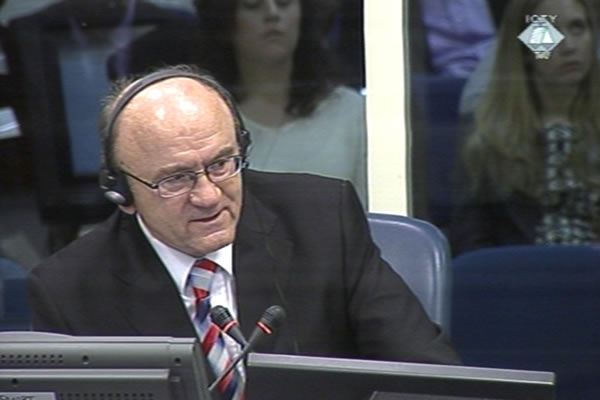Home
BOTH KARADZIC AND MLADIC IN COMMAND OF ARMY
The accused Radovan Karadzic insisted there was ‘the imbalance’ between civilian and military authorities, but General Stanislav Galic said that he as a corps commander had to obey both the president who planned combat operations ‘through his directives’ and Ratko Mladic, whose Main Staff implemented the directives
 Stanislav Galic, defence witness of Radovan Karadzic
Stanislav Galic, defence witness of Radovan Karadzic On the last day of the examination-in-chief of General Galic, the accused Karadzic tried to downplay his role in the military chain of command during the war in BH. Karadzic tried to shift the blame on Ratko Mladic. The accused asked the former Sarajevo-Romanija Corps commander to describe the ‘harmony or rather, the imbalance’ between the civilian and military authorities. The replies Karadzic got didn’t quite support the defense’s case.
General Galic said that Karadzic headed the Supreme Command: in that capacity, he could appoint generals and issue orders to the corps directly or through the Main Staff. The commander-in-chief planned combat operations ‘in principle through directives’, the witness explained. The Main Staff then implemented the directives. That ‘confused people’, the witness pointed, because they didn’t know who was in command of the army and whom they should obey. Karadzic then asked the witness if he would have followed his or Mladic’s orders if they differed. ‘Both, though the principle of single command made Mladic my immediate superior’, Galic explained.
The civilian and military authorities clashed first in 1993 when Mladic’s orders were not in line with Karadzic’s demands. Galic remembered that Karadzic tried to remove Mladic and to seize control over the army in August 1995. Karadzic failed because most of the generals resisted the putsch.
Today the accused showed several orders issued by Galic’s corps command demanding that the subordinates refrain from opening fire on UNPROFOR and instructing them to let the humanitarian convoys pass into Sarajevo. The witness confirmed that the relations with the international forces were good and blamed the BH Army for the attacks on them. Galic tried to contest the prosecution’s allegation that the Serb army cut off the electricity, water and gas supply to the city as a tool to terrorize the population. To corroborate Galic’s claim that the citizens had access to electricity and water, Karadzic asked ‘if there were any epidemics in Sarajevo’. The witness said there were not, noting that it was ‘a real miracle’ that people on both sides of the front lines didn’t get sick, given the poor living conditions.
At the end of the hearing, prosecutor Carolyn Edgerton began the cross-examination. She put it to the witness that he didn’t speak the truth when he claimed that UNPROFOR never protested against the sniper and artillery attacks on the city. Galic corrected himself, saying that he didn’t receive specific complaints about sniper incidents: the letters he received were very general. There were no protests for artillery attacks. UNPROFOR complained only about mortar attacks, Galic explained. He in turn complained that it was difficult to verify the allegations because they were not corroborated by any detailed information.
‘What are civilian areas in Sarajevo anyway?’, the witness asked at one point, referring to the fact that the protests had to do with sniper and mortar fire on civilian areas. Presiding judge Kwon then asked Galic if he thought all parts of Sarajevo were militarized and that there were no civilian areas. ‘I have never said that; it never even crossed my mind’, Galic replied. This is going to be Karadzic’s first task in the re-examination: throughout the trial, the accused has argued that in effect the entire city was the military target.
Stanislav Galic will continue his evidence on Thursday, because Yasushi Akashi, former UN Secretary General’s special envoy, will testify tomorrow.
Linked Reports
- Case : Karadzic
- 2013-04-22 WHAT IF GALIC KNEW ABOUT CRIMES
- 2013-04-18 MLADIC REBUFFS KARADZIC
- 2013-04-18 GENERAL GALIC DENIES RESPONSIBILITY FOR MARKALE 1
- 2013-04-24 AKASHI TESTIFIES AS DIPLOMAT
- 2013-04-25 AKASHI: KARADZIC’S NONCHALANTLY DISTORTED TRUTH
- 2013-05-07 FOOLS WHO TARGETED SARAJEVO CIVILIANS
